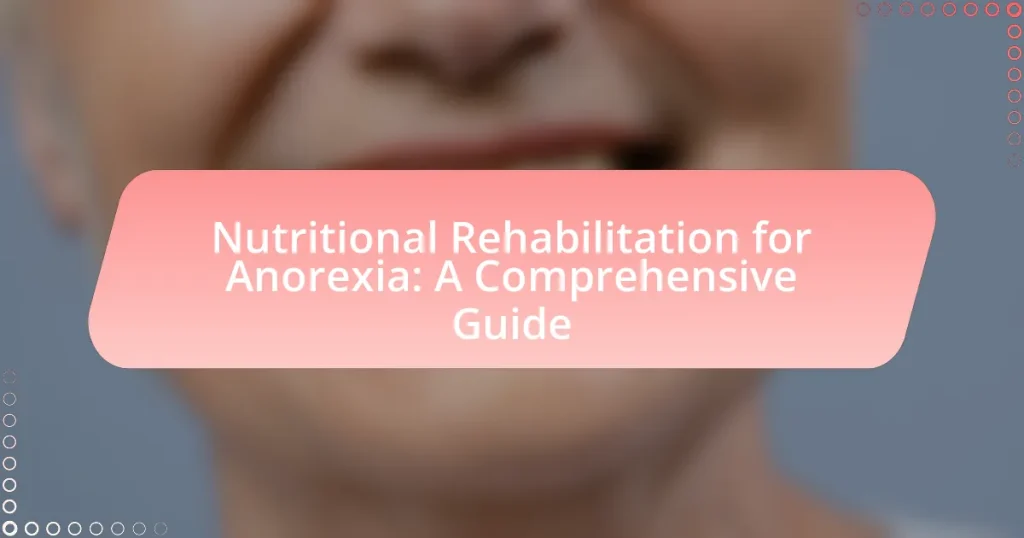Nutritional rehabilitation for anorexia is a structured approach designed to restore healthy weight and nutritional balance in individuals with anorexia nervosa. This process involves carefully monitored dietary interventions that promote weight gain and address nutritional deficiencies, playing a crucial role in both physical and psychological recovery. Key principles include gradual refeeding, individualized meal planning, and the importance of a supportive environment. The article explores how nutritional rehabilitation differs from traditional treatment, the challenges faced during the process, and the critical role of nutrition in recovery, alongside practical tips for enhancing the rehabilitation experience.

What is Nutritional Rehabilitation for Anorexia?
Nutritional rehabilitation for anorexia is a structured approach aimed at restoring a healthy weight and nutritional balance in individuals suffering from anorexia nervosa. This process typically involves a carefully monitored diet that gradually increases caloric intake to promote weight gain while addressing nutritional deficiencies. Evidence shows that nutritional rehabilitation is crucial for recovery, as it not only helps in physical restoration but also supports psychological healing, with studies indicating that proper nutrition can improve mood and cognitive function in patients.
How does Nutritional Rehabilitation address anorexia?
Nutritional rehabilitation addresses anorexia by restoring healthy eating patterns and promoting weight gain through structured meal plans. This approach involves individualized dietary interventions that focus on increasing caloric intake and ensuring nutritional adequacy, which is essential for physical recovery and psychological well-being. Research indicates that a well-structured nutritional rehabilitation program can lead to significant improvements in weight restoration and overall health, as evidenced by studies showing that patients who engage in such programs experience higher rates of recovery and lower relapse rates.
What are the key principles of Nutritional Rehabilitation?
The key principles of Nutritional Rehabilitation include the restoration of nutritional status, gradual refeeding, and individualized meal planning. Restoration of nutritional status aims to correct deficiencies and achieve a healthy weight, which is essential for recovery from anorexia. Gradual refeeding is crucial to prevent refeeding syndrome, a potentially fatal condition that can occur when feeding is resumed too quickly. Individualized meal planning takes into account the patient’s preferences, nutritional needs, and psychological factors, ensuring a supportive and effective approach to rehabilitation. These principles are supported by clinical guidelines that emphasize the importance of a structured and compassionate approach to nutritional recovery in individuals with anorexia.
How does Nutritional Rehabilitation differ from traditional treatment?
Nutritional Rehabilitation differs from traditional treatment primarily in its focus on restoring nutritional health through a structured dietary approach rather than solely addressing psychological or behavioral aspects. While traditional treatment often emphasizes therapy and medication to manage anorexia, Nutritional Rehabilitation prioritizes the re-establishment of healthy eating patterns and weight restoration as foundational steps in recovery. Research indicates that effective nutritional interventions can lead to significant improvements in both physical and psychological health, highlighting the importance of nutrition in the overall treatment of anorexia.
Why is Nutritional Rehabilitation important for recovery?
Nutritional rehabilitation is crucial for recovery from anorexia because it restores essential nutrients and energy balance necessary for physical and psychological healing. This process helps to reverse malnutrition, which can lead to severe health complications, including organ failure and bone density loss. Research indicates that a structured nutritional rehabilitation program can significantly improve weight restoration and metabolic function, as evidenced by a study published in the Journal of Eating Disorders, which found that patients who underwent nutritional rehabilitation showed a 90% improvement in weight and psychological symptoms within six months. Thus, nutritional rehabilitation is a foundational component of effective anorexia treatment, enabling individuals to regain health and stability.
What role does nutrition play in the recovery process?
Nutrition plays a critical role in the recovery process by providing essential nutrients that support physical and mental healing. Adequate nutrition helps restore body weight, improve metabolic function, and enhance overall health, which are vital for individuals recovering from conditions like anorexia. Research indicates that a balanced diet rich in proteins, carbohydrates, fats, vitamins, and minerals is necessary for rebuilding muscle mass, replenishing energy stores, and stabilizing mood. For instance, a study published in the “Journal of Eating Disorders” by Treasure et al. (2015) highlights that nutritional rehabilitation significantly improves recovery outcomes in patients with anorexia nervosa, emphasizing the importance of structured meal plans and nutrient-dense foods in the recovery journey.
How can Nutritional Rehabilitation improve physical health?
Nutritional rehabilitation can significantly improve physical health by restoring essential nutrients and energy levels in individuals suffering from malnutrition, particularly in cases like anorexia. This process helps to reverse the physiological damage caused by inadequate nutrition, leading to improved body weight, muscle mass, and overall metabolic function. Research indicates that proper nutritional support can enhance immune function, reduce the risk of complications, and promote recovery from associated health issues, such as osteoporosis and cardiovascular problems. For instance, a study published in the Journal of Eating Disorders found that patients undergoing nutritional rehabilitation showed marked improvements in weight restoration and metabolic health within a few months of treatment.
What are the challenges faced during Nutritional Rehabilitation?
The challenges faced during nutritional rehabilitation include psychological resistance, medical complications, and nutritional deficiencies. Psychological resistance often manifests as fear of weight gain and anxiety around food, which can hinder progress. Medical complications, such as electrolyte imbalances and gastrointestinal issues, may arise due to malnutrition, complicating the rehabilitation process. Nutritional deficiencies can lead to further health problems, making it essential to address these issues promptly. According to a study published in the Journal of Eating Disorders, approximately 30% of individuals undergoing nutritional rehabilitation experience significant psychological barriers that impede their recovery.
What psychological barriers may hinder progress?
Psychological barriers that may hinder progress in nutritional rehabilitation for anorexia include fear of weight gain, distorted body image, and low self-esteem. Fear of weight gain often leads individuals to resist necessary dietary changes, as they associate food intake with negative outcomes. Distorted body image can cause patients to perceive themselves as overweight despite being underweight, which complicates their willingness to engage in treatment. Low self-esteem may result in feelings of worthlessness, making it difficult for individuals to believe they deserve recovery or to adhere to nutritional guidelines. These barriers are supported by research indicating that cognitive distortions and emotional factors significantly impact treatment adherence and outcomes in anorexia nervosa (Treasure et al., 2015, “The Role of Psychological Factors in the Treatment of Anorexia Nervosa,” International Journal of Eating Disorders).
How can caregivers support individuals in Nutritional Rehabilitation?
Caregivers can support individuals in Nutritional Rehabilitation by providing structured meal plans, emotional support, and monitoring progress. Structured meal plans ensure that individuals receive balanced nutrition tailored to their needs, which is crucial for recovery from anorexia. Emotional support helps individuals cope with the psychological aspects of their condition, fostering a safe environment for open communication. Monitoring progress allows caregivers to track dietary intake and emotional well-being, ensuring that any setbacks are addressed promptly. Research indicates that a supportive environment significantly enhances recovery outcomes in nutritional rehabilitation for anorexia, highlighting the importance of caregiver involvement in this process.

What are the components of an effective Nutritional Rehabilitation program?
An effective Nutritional Rehabilitation program consists of individualized meal planning, nutritional education, psychological support, and regular monitoring of progress. Individualized meal planning ensures that the dietary needs of the patient are met, taking into account their specific health status and preferences. Nutritional education empowers patients with knowledge about healthy eating habits and the importance of nutrition in recovery. Psychological support addresses the emotional and mental aspects of anorexia, which are crucial for successful rehabilitation. Regular monitoring of progress allows healthcare providers to adjust the program as needed, ensuring that the patient is on track to recovery. These components are essential for addressing both the physical and psychological challenges associated with anorexia.
How is a personalized meal plan developed?
A personalized meal plan is developed by assessing an individual’s nutritional needs, preferences, and health goals. This process typically involves a comprehensive evaluation that includes dietary history, medical conditions, lifestyle factors, and personal food preferences. Registered dietitians or nutritionists often conduct this assessment to ensure that the meal plan is tailored to support recovery, particularly in cases of anorexia, where specific caloric and nutrient requirements are critical for restoring health. Research indicates that individualized meal plans can significantly improve nutritional intake and psychological well-being in patients undergoing treatment for eating disorders.
What factors are considered in creating a meal plan?
Creating a meal plan involves several key factors, including individual nutritional needs, dietary restrictions, food preferences, and caloric requirements. Individual nutritional needs are determined by factors such as age, sex, weight, height, and activity level, which influence the specific macronutrient and micronutrient requirements. Dietary restrictions may arise from medical conditions, allergies, or personal choices, necessitating careful selection of foods to ensure safety and adherence. Food preferences play a crucial role in meal plan acceptance, as incorporating liked foods increases the likelihood of compliance. Lastly, caloric requirements are calculated based on the goal of weight restoration or maintenance, particularly important in the context of nutritional rehabilitation for anorexia, where a structured approach is essential for recovery.
How can meal plans be adjusted over time?
Meal plans can be adjusted over time by regularly evaluating an individual’s nutritional needs, preferences, and progress. This involves monitoring weight changes, energy levels, and overall health to determine if the current meal plan meets the individual’s requirements. Adjustments may include increasing or decreasing portion sizes, incorporating new food items, or modifying meal frequency based on the individual’s response to the diet. Research indicates that personalized meal plans that adapt to the evolving needs of individuals undergoing nutritional rehabilitation can enhance adherence and improve outcomes, as evidenced by studies showing that tailored dietary interventions lead to better recovery rates in patients with anorexia.
What role does monitoring play in Nutritional Rehabilitation?
Monitoring plays a critical role in Nutritional Rehabilitation by ensuring that patients receive appropriate dietary intake and track their progress towards recovery. It involves regular assessment of nutritional status, weight changes, and adherence to dietary plans, which are essential for identifying any complications or setbacks in the rehabilitation process. Research indicates that consistent monitoring can lead to improved outcomes, as it allows healthcare providers to make timely adjustments to treatment plans based on individual patient needs and responses. For instance, studies have shown that patients who undergo regular monitoring during nutritional rehabilitation experience higher rates of weight restoration and psychological improvement compared to those who do not.
How often should progress be assessed?
Progress should be assessed weekly during nutritional rehabilitation for anorexia. This frequency allows healthcare providers to closely monitor changes in weight, dietary intake, and psychological well-being, ensuring timely adjustments to the treatment plan. Research indicates that regular assessments can lead to better outcomes, as they facilitate early identification of any issues that may arise, allowing for prompt intervention.
What metrics are used to evaluate success?
Metrics used to evaluate success in nutritional rehabilitation for anorexia include weight gain, improvement in nutritional intake, psychological assessments, and overall health markers. Weight gain is often quantified as a percentage of the individual’s ideal body weight, with a target of 90% or more being a common benchmark. Improvement in nutritional intake is assessed through dietary logs and adherence to meal plans, ensuring patients meet their caloric and nutrient needs. Psychological assessments, such as standardized questionnaires, evaluate changes in attitudes towards food and body image. Overall health markers, including blood tests to monitor electrolyte levels and organ function, provide additional insights into the patient’s recovery progress. These metrics collectively offer a comprehensive view of the effectiveness of nutritional rehabilitation efforts.
What nutritional education is provided during rehabilitation?
Nutritional education during rehabilitation for anorexia focuses on teaching individuals about balanced diets, portion sizes, and the importance of macronutrients and micronutrients. This education aims to help patients understand the role of food in recovery, emphasizing the need for adequate caloric intake to restore health and support physical and mental well-being. Evidence shows that structured nutritional education can improve dietary habits and promote weight restoration, which is crucial for recovery from anorexia.
How can individuals learn about balanced diets?
Individuals can learn about balanced diets through various educational resources, including nutrition courses, books, and reputable online platforms. These resources often provide structured information on macronutrients, micronutrients, and portion sizes, which are essential for understanding how to create a balanced meal plan. For instance, the Dietary Guidelines for Americans, published by the U.S. Department of Agriculture, outlines key recommendations for a healthy diet, emphasizing the importance of fruits, vegetables, whole grains, and lean proteins. Additionally, consulting with registered dietitians can offer personalized guidance tailored to individual health needs and dietary preferences.
What resources are available for ongoing education?
Resources available for ongoing education in nutritional rehabilitation for anorexia include online courses, webinars, and professional organizations. Online platforms like Coursera and edX offer courses on nutrition and mental health, while organizations such as the Academy of Nutrition and Dietetics provide access to research articles, guidelines, and continuing education opportunities. Additionally, conferences and workshops hosted by relevant associations facilitate networking and knowledge sharing among professionals in the field. These resources ensure that practitioners stay updated on the latest evidence-based practices and interventions for treating anorexia through nutritional rehabilitation.

How can individuals and families support Nutritional Rehabilitation?
Individuals and families can support nutritional rehabilitation by actively participating in meal planning and preparation, ensuring that nutritious foods are available and appealing. Engaging in regular family meals fosters a supportive environment, which is crucial for individuals recovering from anorexia. Research indicates that structured meal times can improve dietary intake and promote healthier eating habits, as seen in studies highlighting the importance of social support in recovery processes. Additionally, families can educate themselves about nutritional needs and collaborate with healthcare professionals to create tailored meal plans that address specific deficiencies and preferences.
What strategies can families use to encourage healthy eating?
Families can encourage healthy eating by involving children in meal planning and preparation. Engaging children in these activities fosters a sense of ownership and interest in food choices, which can lead to healthier eating habits. Research indicates that children who participate in cooking are more likely to consume fruits and vegetables (Harris et al., 2018, Journal of Nutrition Education and Behavior). Additionally, families can establish regular meal times and create a positive eating environment, which has been shown to improve dietary intake and reduce the risk of disordered eating behaviors.
How can communication improve the rehabilitation process?
Effective communication enhances the rehabilitation process by fostering trust and understanding between patients and healthcare providers. Clear dialogue allows for the accurate exchange of information regarding treatment goals, dietary needs, and emotional support, which are crucial for individuals recovering from anorexia. Research indicates that strong therapeutic alliances, built through open communication, significantly improve treatment adherence and outcomes, as evidenced by a study published in the Journal of Eating Disorders, which found that patients who engaged in regular discussions with their care teams reported higher satisfaction and better recovery rates.
What role does a supportive environment play in recovery?
A supportive environment plays a crucial role in recovery from anorexia by fostering emotional safety and encouraging positive behavioral changes. This environment can include family, friends, and healthcare professionals who provide understanding, empathy, and motivation, which are essential for individuals facing the challenges of recovery. Research indicates that social support significantly enhances treatment outcomes, as individuals with strong support systems are more likely to adhere to nutritional rehabilitation plans and engage in healthy coping strategies. For instance, a study published in the Journal of Eating Disorders found that patients with supportive relationships reported lower levels of anxiety and higher levels of motivation to recover, demonstrating the direct impact of a nurturing environment on recovery success.
What are some common misconceptions about Nutritional Rehabilitation?
Common misconceptions about nutritional rehabilitation include the belief that it solely focuses on weight gain, that it is a quick fix, and that it does not address psychological aspects. Nutritional rehabilitation is a comprehensive approach that emphasizes restoring nutritional health while also considering emotional and psychological factors. Research indicates that effective nutritional rehabilitation for anorexia involves a structured plan that includes therapy and support, not just dietary changes, highlighting the importance of addressing underlying mental health issues alongside physical recovery.
How can misinformation impact treatment outcomes?
Misinformation can significantly impair treatment outcomes for anorexia by leading patients to adopt harmful dietary practices or reject evidence-based interventions. For instance, patients may believe in unverified diets or treatments that promise quick results, which can exacerbate their condition and hinder recovery. Research indicates that misinformation can create confusion about nutritional needs, resulting in inadequate caloric intake and worsening health complications. A study published in the Journal of Eating Disorders found that individuals exposed to misleading information about nutrition were less likely to adhere to prescribed treatment plans, ultimately prolonging their recovery time and increasing the risk of relapse.
What should individuals know to avoid these misconceptions?
Individuals should know that misconceptions about nutritional rehabilitation for anorexia often stem from a lack of understanding of the condition and its treatment. For instance, many believe that simply increasing food intake will resolve anorexia, but effective rehabilitation requires a structured approach that includes psychological support and individualized meal plans. Research indicates that comprehensive treatment, which combines nutritional education with therapy, significantly improves recovery outcomes (Treasure et al., 2015, “The Role of Nutrition in the Treatment of Eating Disorders,” Journal of Eating Disorders). Understanding these aspects helps individuals recognize the complexity of anorexia and the necessity of professional guidance in the recovery process.
What practical tips can enhance the Nutritional Rehabilitation experience?
Practical tips to enhance the Nutritional Rehabilitation experience include establishing a structured meal plan, incorporating nutrient-dense foods, and fostering a supportive environment. A structured meal plan helps individuals maintain consistency and ensures they receive adequate nutrition, which is crucial for recovery from anorexia. Nutrient-dense foods, such as avocados, nuts, and whole grains, provide essential vitamins and minerals that support physical and mental health during rehabilitation. Additionally, a supportive environment, including family involvement and professional guidance, can significantly improve adherence to the rehabilitation process and emotional well-being, as studies indicate that social support is linked to better recovery outcomes in eating disorders.


